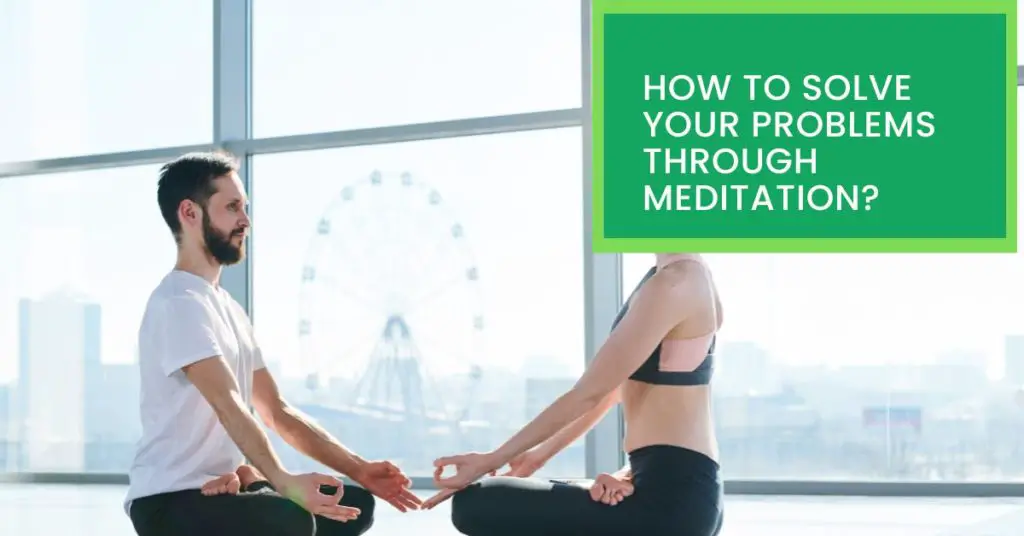When it comes to problem-solving, many of us tend to focus on the task at hand and try to come up with a solution as quickly as possible. However, this approach can often lead to frustration and even more stress.
Instead, try meditating on the problem. This doesn’t mean that you should sit down and clear your mind of all thoughts. Instead, focus on the problem itself and try to see it from different perspectives.
You may be surprised at how much more clarity you can achieve by simply taking a step back and spending some time focusing on the problem itself.
In this article, we’ll explore how meditation can help you solve problems more effectively and even prevent future problems from arising.
What Is Meditation For Problem Solving?
Meditation is a practice that allows you to focus your attention and become more aware of the present moment. It has been shown to provide numerous benefits, including reducing stress, improving concentration, and promoting creativity.
When it comes to problem-solving, meditation can help you in two main ways. First, it can allow you to take a step back and view the problem from a different perspective. This can help you see the situation more clearly and find new solutions you may not have considered before.
Second, meditation can help to reduce stress and anxiety, which can often cloud our judgment and make it more difficult to find solutions. By meditating on the problem, you can clear your mind and approach the situation with a more open and relaxed state of mind.
How to Meditate on a Problem
There are many ways to meditate, but the basic principle is always the same: focusing your attention on a single point. This can be done by focusing on your breath, a mantra, or even just a simple object.
When it comes to problem-solving, you can use meditation to focus on the problem itself. For example, you may want to spend some time thinking about the problem’s different aspects and how it affects your life.
You can also use meditation to visualize a solution to the problem. See yourself in a future where the problem has been resolved, and everything is going well. This can help to increase your motivation and encourage you to take action.
If you’re not sure how to get started, there are many resources available that can help you learn how to meditate. Once you get the hang of it, you may even find that you enjoy the process and want to make it a regular part of your life.
What to do When You’re Feeling Stressed or Anxious?
There are a lot of things that can cause stress and anxiety. It could be work, school, family, or personal problems.
Whatever the cause, it’s important to find ways to cope with these feelings. Otherwise, they can start to take over your life and make everything feel much harder than it needs to be.
Here are some tips for dealing with stress and anxiety:
1. Identify the source of your stress or anxiety. This is the first step to finding a way to deal with it. If you can’t identify the source, it will be much harder to find a way to cope.
2. Talk to someone about what’s going on. It can be really helpful to talk to someone who will understand and can offer some helpful advice. Sometimes it’s just helpful to get things off your chest.
3. Try relaxation techniques. There are a lot of different ways to relax. Some people find that deep breathing exercises help, while others prefer activities like yoga or meditation. Find what works best for you and make time for it every day.
4. Exercise. Exercise is a great way to reduce stress and anxiety. It helps to get your mind off of whatever is causing you stress and releases endorphins, which have mood-boosting effects.
5. Make time for things you enjoy. Don’t let stress and anxiety take over your life. Make sure to schedule time for things you enjoy, whether it’s reading, going for walks, or spending time with friends and family.
These are just a few ideas for dealing with stress and anxiety. Talk to your doctor or mental health professional if you’re feeling overwhelmed.
Tips For Staying Motivated to Meditate
It can be tough to stick with a meditation practice, especially if you’re new to it. Here are a few tips to help you stay motivated:
1. Set realistic goals for yourself. If you’re just starting out, don’t try to meditate for an hour every day. Start with 5 or 10 minutes, and gradually increase the time as you become more comfortable with it.
2. Find a time that works for you. Some people like to meditate first thing in the morning, while others find it more helpful to do it at night before bed. Experiment until you find a time that works best for you.
3. Make it part of your routine. Once you’ve found a time that works for you, make it part of your daily routine, so it becomes automatic.
4. Be patient with yourself. Meditation can be challenging at first, and having trouble sitting still or keeping your mind from wandering is normal. Don’t get discouraged – just keep practising, and it will get easier with time.
5. Find a meditation group or teacher. If you’re having trouble getting started on your own, try finding a meditation class or group in your area. Having someone to guide you and answer your questions can be very helpful.
Following these tips should help you stay motivated to meditate and make it a regular part of your life. Just remember to be patient with yourself, and keep at it – the benefits are worth it!
Frequently Asked Questions Related to Meditation And Problem Solving
1. What does it mean to meditate on a problem?
When you meditate on a problem, you focus your thoughts on it in order to understand it deeply. This usually involves thinking about the problem from different angles and brainstorming possible solutions.
By taking the time to engage with the problem fully, you can often come up with a better solution than if you had just tried to brute-force your way through it.
In addition, meditation can help you clear your mind and stay calm under pressure, which can be helpful when solving difficult problems.
2. Can overthinking be cured by meditation?
Overthinking can be cured by meditation.
When the mind is constantly churning, it’s difficult to find peace and clarity. Meditation provides a quiet space for the mind to rest and relax, which in turn allows for better decision-making and problem-solving.
Meditation helps us become more aware of our thoughts and emotions and let go of what doesn’t serve us. With time and practice, we can learn to diffuse stressful thoughts before they have a chance to take hold.
In this way, meditation can be a powerful tool for promoting mental well-being.
3. How do you know meditation is working?
One of the first signs that you’re meditating correctly is a sense of heightened awareness. Other signs include feeling more relaxed, less stressed, and more focused.
If you’re new to meditation, it may take some time before you notice any changes. But with practice, you should start to see and feel the benefits of meditation.





